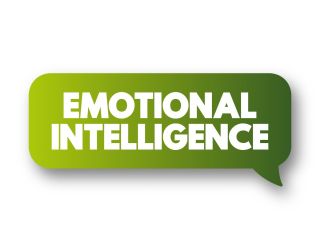Emotional Intelligence
Emotional Intelligence Is a Buffer Against Destructive Anger
Skills in EI help us improve relationships with others and ourselves.
Posted April 20, 2023 Reviewed by Vanessa Lancaster
Key points
- The psychological benefits of high emotional intelligence have been found across a broad range of professions, gender, and ages.
- Skills in emotional regulation are crucial for being able to manage anger constructively.
- Enhancing EI promotes physical and emotional well-being.

Both Roberto and Keith have a 45-minute commute time from their homes to their workplace. When Roberto drives, he brings his capacity to sit with and calm his emotions. He has realistic expectations of how others drive and how long the trip should take. Overall, he is able to adapt to any unexpected challenges he may face on the road. While he may at times feel frustrated or even slightly annoyed, he rarely becomes angry.
By contrast, Keith drives with a tendency for anger arousal, partly due to unrealistic expectations of other drivers, his quickness to personalize and feel threatened by the actions of others, and his inability to sit with and calm his frustration. He maintains rigid expectations regarding how traffic “should” be, how long his trip “should” take, and how others “should” drive.
The difference between how Roberto and Keith experience their drive to work, especially with regard to anger arousal, is very much influenced by their emotional intelligence.
Emotional Intelligence
In his book Emotional Intelligence, psychologist Daniel Goleman proposed that emotional intelligence (EI) matters more than a person’s intelligence (IQ). He breaks emotional intelligence into five components:
- Self-awareness: This entails the ability to recognize, distinguish and understand our moods and emotions and how they impact our behavior. Additionally, it is the capacity to recognize how they impact others.
- Self-regulation: This involves the capacity to control our impulses and moods and to pause in order to think before acting. It allows us to accept the full range of our emotions, a distinguishing aspect of what makes us human. It helps us to sit with vulnerable emotions such as fear, shame, insecurity, and sadness. In effect, such regulation is an antidote to emotional avoidance. For this reason, self-regulation may be considered a prerequisite for greater self-awareness.
- Internal (or intrinsic) motivation: This means being driven to pursue goals for personal reasons rather than for some kind of reward. Emotional intelligence is a powerful driver of intrinsic motivation. It involves identifying and living according to our values, grounded in our needs and what gives us meaning.
- Empathy: Essential for building all relationships, empathy is recognizing and understanding others’ motivations and putting ourselves in their shoes. This entails cognitive and emotional empathy. The former involves the ability to recognize and understand what another might be thinking and feeling, while the latter consists of being able to feel what the other is feeling.
- Social skills: Social skills are essential to managing relationships, building networks, and connecting with people. They also involve being able to understand and manage our emotions in reaction to the emotions of others.
Constructively Managing Anger
Emotional intelligence is crucial for helping individuals choose constructive over destructive anger. A key aspect of healthy anger is being able to pause and reflect on, rather than react to, our thoughts, feelings, and sensations associated with anger arousal. In most situations, anger is a reaction to and distraction from the intense suffering associated with negative emotions. As such, anger can be viewed as a form of emotional avoidance,
The capacity for self-regulation is foundational to allowing us to recognize and sit with those uncomfortable feelings that lead to anger. Self-regulation helps us to control our impulses and moods. Essentially, it involves training our rational brain to override our emotional brain.
Anger stems from a perceived threat to our emotional and physical well-being to our core desires and needs. Identifying these core desires and needs helps us better understand our anger arousal. Doing so can help us distinguish between real and perceived threats to our well-being.
Empathy can be a buffer against destructive anger, including physical or verbal aggression toward others. It helps us to recognize the humanity in others and ourselves. And this is an essential component of meaningful relationships.
Emotional Intelligence and Anger
Cumulative research has found that people with higher EI show less aggression (Garcia-Sancho et al., 2014). In one study, High EI was similarly found to have a negative relationship for boys and girls (aged 13-19) with state and trait anger (Mubashir & Dawood, 2021). Deficits in various sub-scales of emotional intelligence, like self-regulation, self-awareness, and motivation, emerged as significant predictors of anger in adolescents.
A study of medical postgraduates found that those low in EI were more prone to anger in their work environment (Faye et al., 2011). A study of 1102 Spanish secondary education students found that those with greater emotional understanding and emotional regulation were less likely to be victims, aggressors, or victim-aggressors concerning cyberbullying (Martinez-Monteagudo et al., 2019).
The psychological benefits of high emotional intelligence have been found across a broad range of professions, gender, and ages. A study of teachers found that those high in EI were more able to control their anger instead of suppressing it or reflecting it outward (Baltaci & Demir, 2012).
Whereas sports call for a certain degree of aggressive behavior in achieving goals, it can undermine performance when expressed destructively. One study of soccer players found that emotional intelligence significantly predicted aggression, with higher EI leading to less expression of such anger (Abdoli et al., 2008).
Emotions have a meaningful impact on driving safety. This was supported by a study of 304 drivers (aged 18-57) which concluded that higher EI, especially emotional regulation, was associated with less maladaptive expressions of driving anger.
Training in EI and Its Impact on Anger
These studies suggest that training in emotional intelligence can powerfully impact how anger arousal is managed. This was supported by a three-year longitudinal study of 476 adolescents who showed reduced physical and verbal aggression that coincided with training (Castillo-Guaida et al., 2017).
Children and adults can learn skills to enhance their emotional intelligence and, by doing so, develop resilience for dealing with various negative affect, including anger. Many workbooks offer skills in emotional intelligence to promote empathy and self-awareness regarding emotions and how they impact our beliefs and behavior. Some highlight mindfulness techniques to help readers become more present with their thoughts and emotions.
Others emphasize cognitive behavioral techniques that help people learn emotional regulation, in part, by identifying distortions in thinking that might promote emotional dysregulation. Additionally, some resources are integrative, borrowing from various theoretical orientations to increase emotional intelligence.
Clearly, Keith would benefit by learning the skills to enhance his emotional intelligence. By doing so, he would experience greater emotional and cognitive flexibility that could support a more tranquil commute to work.
Based on my years as a clinician specializing in anger management, I firmly believe that learning skills in emotional intelligence should be the core focus in helping individuals more constructively manage this highly challenging and complex emotion. Enhancing skills in this area can help to improve physical and emotional well-being and contribute to more fulfilling relationships.
To find a therapist, visit the Psychology Today Therapy Directory.
References
Garcia-Sancho, E., Salguero, J., and Fernandez-Berrocal, P. (2014). Relationship between emotional intelligence and aggression: A systemic review. Aggression and Violent Behavior, Vol. 19 (5), 584-591.
Mubashir, A., (2021). Disparities in emotional intelligence in relation to anger experiences among adolescents in Pakistan. Ilkogretim Online - Elementary Education Online, 2021; Vol 20 (1): pp. 8265-8279 http://ilkogretim-online.org
doi: 10.17051/ilkonline.2021.01.845
Faye, A, Kaira, G, Swamy, R, et. al., (2011). Study of emotional intelligence and empathy in medical postgraduates. Indian Journal of Psychiatry, Vol. 53 (2), 140-144. 10.4103/0019-5545.82541
Martinez-Moneagudo, Delgado, B, Manuel, J, et. al., (2019). Cyberbullying, aggressiveness, and emotional intelligence in adolescence. Int. Journal Environmental Research Public Health, 16, 5070, :10.3390/ijerph16245079
Baltaci, H., (2012). Pre-service classroom teachers’ emotional intelligence and anger expression styles. Educational Sciences: Theory and Practice, Vol. 12 (4) 2422-2428
Castillo-Gualda, R., Cabello, R., Herrero, M. et. al. (2017). A three-year emotional intelligence intervention to reduce adolescent aggression: The mediating role of unpleasant affectivity. Journal of Research on Adolescence, Vol. 28, 186-198
Zhou, Y., Qu, W., and Ge, Y., (2022), The role of trait emotional intelligence in driving ange: The mediating effect of emotional regulation. Transportation Research Part F: Traffic Psychoogy and Behavior Vol. 88, July, 281-290




